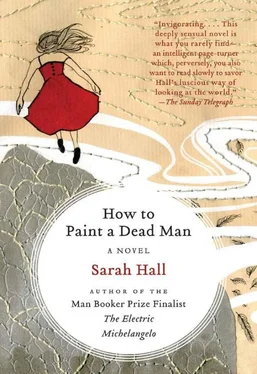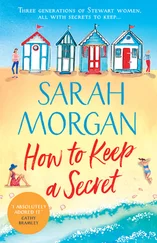Sarah Hall - How to Paint a Dead Man
Здесь есть возможность читать онлайн «Sarah Hall - How to Paint a Dead Man» весь текст электронной книги совершенно бесплатно (целиком полную версию без сокращений). В некоторых случаях можно слушать аудио, скачать через торрент в формате fb2 и присутствует краткое содержание. Год выпуска: 2009, Издательство: Harper Perennial, Жанр: Современная проза, на английском языке. Описание произведения, (предисловие) а так же отзывы посетителей доступны на портале библиотеки ЛибКат.
- Название:How to Paint a Dead Man
- Автор:
- Издательство:Harper Perennial
- Жанр:
- Год:2009
- ISBN:нет данных
- Рейтинг книги:4 / 5. Голосов: 1
-
Избранное:Добавить в избранное
- Отзывы:
-
Ваша оценка:
- 80
- 1
- 2
- 3
- 4
- 5
How to Paint a Dead Man: краткое содержание, описание и аннотация
Предлагаем к чтению аннотацию, описание, краткое содержание или предисловие (зависит от того, что написал сам автор книги «How to Paint a Dead Man»). Если вы не нашли необходимую информацию о книге — напишите в комментариях, мы постараемся отыскать её.
, Sarah Hall, "one of the most significant and exciting of Britain's young novelists" (
), delivers "a maddeningly enticing read... an amazing feat of literary engineering" (
).
How to Paint a Dead Man — читать онлайн бесплатно полную книгу (весь текст) целиком
Ниже представлен текст книги, разбитый по страницам. Система сохранения места последней прочитанной страницы, позволяет с удобством читать онлайн бесплатно книгу «How to Paint a Dead Man», без необходимости каждый раз заново искать на чём Вы остановились. Поставьте закладку, и сможете в любой момент перейти на страницу, на которой закончили чтение.
Интервал:
Закладка:
Next to her bed, as the nurse swabbed the distended ring of flesh, you bit your lip and hated her. You wanted to shout in her face, stick pins in her forehead, anything to get a response. You wanted to scream at her for not being Danny, stand up, and walk out. Of that day’s visits, you didn’t know which was worse-the flowering, planted graveyard to which you had just been, or this vacant form in the bed. Life is a joke, you thought. It is worthless. And there is no point. There is no point.
Your mum made a pot of herbal tea when you got back to the cottage and you sat with her at the kitchen table. The house was cold, the windows trickling with condensation. Neither of them ever notice the chill in the house the way you do now. The south is making you soft. Upstairs you could hear your dad clomping and banging in the studio, the deep drawers of his apothecary chest being jerked open and slammed shut. Looking for something that probably never existed, your mum said and smiled, all the tiny lines around her eyes creasing. She was tired, you could see that; her skin was unusually dry and her hair was greyer. Losing a son had altered her vitality; it had leached her lustre. But she was sitting erect in her usual chair by the range, her woollen jumper brightly flecked with blue and yellow, and she seemed to fit the room so well.
When you were a kid it was the same: she always matched the surroundings perfectly, wherever she was, in the garden, by the river, being blown about town when she was shopping. Sometimes she would seem almost to disappear, and then she would move, to fetch something or make something, and you would catch sight of her again, and you would be amazed by her camouflage. You always wanted to ask her how she could accept everything so gracefully, how she could belong?
She was your father’s exact opposite. Where he was extraordinarily plumed and song-filled, your mother was quiet and ordinary. They were like finches, the pair of them.
You watched her stirring the pot of tea, holding a strainer over the cup, the stream of yellow liquid directed perfectly, without a drop being spilled. Do you want honey, poppet ? She asked as if giving you the option, knowing you take it, and already passing you the jar.
When you were younger she had experimented with Buddhism and had gone on a few retreats, leaving your dad to manage the household. You would hear nothing from her for three weeks. Sometimes you had imagined she’d left you all. No-left him, because he was so often overwhelming. The chaos was always restored within a few hours of her getting home; the beds straightened, the bread bin filled. She would talk about containers and cleansing, the way to breathe. Your dad joked that she was hinting about his homebrew and his rollies, but you could tell he was pleased. She was home and he was over the moon. Often you would see her meditating by the elm tree in the garth, cross-legged, in her moccasins.
She went with you every week to see Dr Dixon at the health clinic. She never went into town to kill the hour, was always there reading Digest magazines or bracken-control leaflets when you came back out into the waiting room. Or she’d be gazing at the stick insects twitching on their leaves, fascinated. You knew it bothered her, that she was not really convinced about the need for treatment. She was not one for interference. Later, she apologised for making you go. We should have trusted you were going to be OK. I hope it wasn’t too awful. We weren’t trying to hurt you .
She handed you the cup of tea and the wooden honey pestle. Darling, she said, my darling, and for a moment the maternal guard slipped, and you saw the rawness behind, as if half of her had been cut away. You stood up, walked round the table and hugged her. You were still hugging her when your dad came in. Aha! Here you are, pet. In the artist’s fucking shoes, eh! In his hand was a lumpy object wrapped in a piece of chamois leather. He stood in the middle of the room, shrugged his shoulders a couple of times like a magician preparing for a trick. Then he slowly turned back the corners of the wrapping, being a total ham. You were braced, as ever, for proportionate disappointment, for having to put up with some elaborate act, the gold-spun-from-straw routine. Inside the rag was a bottle. You looked at him blankly, waited for him to make his inevitable declaration, which of course he did. It’s for the exhibition. I’ve hunted it out to loan it to you. Go on. Here. He waved the bottle at you. After a moment’s hesitation you took it. It was a familiar item, the patchy glaze, the old-fashioned proportions. It had been in his studio for years, moving to various new locations around the messy, tobacco-stained room. For a while it had stood on the windowsill, then on the desk. It had been in the alcove next to the fireplace, holding his longest brushes and a dry teasel, part of the clutter, one of your dad’s many inexplicable collectables. That old thing, Peter, your mum said.
You heard yourself tut in that petulant way, and tried to explain the concept of the exhibition again. You tried to keep a pleasant tone, not turn into the sulky teenager you so often do when he makes a song and dance about something. You explained you couldn’t just put any old thing in the show. It had to have associative significance, and where possible, a certificate of authenticity. Van Gogh plus hanky. Magritte plus pipe. An instantly recognisable motif. The words came out wrong, sounded too harsh.
Silence. The usual, awkward interstices between you. You knew it could grow wider or it could come together, one of you had to make a move. Then your dad laughed a high-pitched, boomerang laugh that bounced off the ceiling and the walls and landed back inside him. It’s not mine, Fanny Ann. He tapped his head. There is still a bit of computing left up there, you know. It’s Giorgio’s. He rested a big paw on your shoulder, leant downwards conspiratorially and whispered. Right though, you best say it’s from an anonymous donator, cause there was a bit of unofficial liberating en Italia, if you get my bloody drift. He made a whistling sound. You heard yourself sigh.
You’d been there before, in this theatre of operations, a hundred times and more. Rationally, you knew what to do. Usually, it was not what you would do. What you would do was refuse to believe his yarn, his hokum, his stupendous bullshit. You’d tell him you weren’t seven years old any more, when your dad would go overboard trying to convince you he had known Wallis, Hughes, Warhol, all of them old pals, chums, brothers in arms. You would spit, and shout, and be irrationally annoyed. And this, in the fourth decade of your life, was still the usual drill.
But out of the corner of your eye you saw there were still a few old scabs on his knuckles from breaking stone in the quarry the day that Danny died. They were brown and cracked and dry, and it looked as if he had been worrying them. He had broken one of his own beloved rules— An artist must always protect his hands —and so you surprised yourself. You agreed. You said you’d check with Angela and if she had no objection, it could go into the show.
He almost burst with joy. Literally. You could see him inflating, through his shoulders, through his cheeks, as if he was attached to a pneumatic pump. Brilliant, Suze, just bloody brilliant. I must have found it for a reason. I mean, these things don’t just happen…
On the train back to London you opened your bag and took the thing out. It certainly looked the part. He might have got it from a flea market, or a junk shop, or a dead relative; you would probably never know. Or maybe your old man’s great-uncle twice removed was the cousin of the reclusive Italian. It was simply a bottle, a bottle by name and description, with no pedigree but for the word of your dad.
Читать дальшеИнтервал:
Закладка:
Похожие книги на «How to Paint a Dead Man»
Представляем Вашему вниманию похожие книги на «How to Paint a Dead Man» списком для выбора. Мы отобрали схожую по названию и смыслу литературу в надежде предоставить читателям больше вариантов отыскать новые, интересные, ещё непрочитанные произведения.
Обсуждение, отзывы о книге «How to Paint a Dead Man» и просто собственные мнения читателей. Оставьте ваши комментарии, напишите, что Вы думаете о произведении, его смысле или главных героях. Укажите что конкретно понравилось, а что нет, и почему Вы так считаете.












